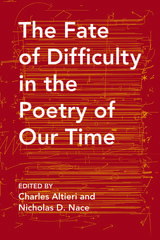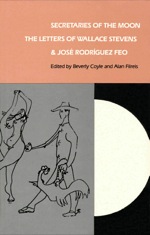2 books by Filreis, Al

The Fate of Difficulty in the Poetry of Our Time
Edited by Charles Altieri and Nicholas D. Nace
Northwestern University Press, 2017
The Fate of Difficulty in the Poetry of Our Time offers original readings of poems composed in this century—poems that are challenging to follow, challenging to understand, challenging to discuss, and challenging to enjoy. Difficult poetry of the past relied on allusion, syntactic complexity, free association, and strange juxtapositions. The new poetry breaks with the old in its stunning variety; its questioning of inherited values, labels, and narratives; its multilingualism; its origin in and production of unnamed affects; and its coherence around critical and social theorists as much as other poets.
The essays in this volume include poets writing on the works of a younger generation (Lyn Hejinian on Paolo Javier, Bob Perelman on Rachel Zolf, Roberto Tejada on Rosa Alcalá), influential writers addressing the work of peers (Ben Lerner on Maggie Nelson, Michael W. Clune on Aaron Kunin), critics making imaginative leaps to encompass challenging work (Brian M. Reed on Sherwin Bitsui, Siobhan Philips on Juliana Spahr), and younger scholars coming to terms with poets who continue to govern new poetic experimentation (Joseph Jeon on Myung Mi Kim, Lytle Shaw on Lisa Robertson).
In pairings that are both intuitive (Marjorie Perloff on Craig Dworkin) and unexpected (Langdon Hammer on Srikanth Reddy), The Fate of Difficulty in the Poetry of Our Time illuminates the myriad pathways and strategies for exploring difficult poetry of the present.
The essays in this volume include poets writing on the works of a younger generation (Lyn Hejinian on Paolo Javier, Bob Perelman on Rachel Zolf, Roberto Tejada on Rosa Alcalá), influential writers addressing the work of peers (Ben Lerner on Maggie Nelson, Michael W. Clune on Aaron Kunin), critics making imaginative leaps to encompass challenging work (Brian M. Reed on Sherwin Bitsui, Siobhan Philips on Juliana Spahr), and younger scholars coming to terms with poets who continue to govern new poetic experimentation (Joseph Jeon on Myung Mi Kim, Lytle Shaw on Lisa Robertson).
In pairings that are both intuitive (Marjorie Perloff on Craig Dworkin) and unexpected (Langdon Hammer on Srikanth Reddy), The Fate of Difficulty in the Poetry of Our Time illuminates the myriad pathways and strategies for exploring difficult poetry of the present.
[more]

Secretaries of the Moon
The Letters of Wallace Stevens and José Rodriguez Feo
Beverly Coyle and Alan Filreis, eds.
Duke University Press, 1986
The letter from Jose Rodriguez Feo that prompted Stevens's poem was the third in a ten-year correspondence (1944-54) between the poet and the young Cuban, who quickly became Stevens's "most exciting correspondent." The two shared a Harvard education, both were anxious to see Stevens translated for a Cuban audience, and each had an enduring admiration for Santayana, whose awareness of the cultural tensions between the Northern and Southern hemispheres formed a basis for the protracted argument between Stevens as the practical, Protestant father and the passionate Rodriguez Feo. The Cuban's descriptions of his life at the Villa Olga, of his black-and-white cow Lucera and his mule Pompilio, delighted Stevens, as did his wide-ranging questions and pronouncements of literary matters. Unaware of the well-known Stevens reticence, Rodriguz Feo elicited a more informal, playful response than Stevens's other correspondents. Formal salutations soon gave way to "Dear Antillean," "Dear Wallachio."
Coyle and Filreis present the entire extant correspondence between the two men. The fifty-one Rodriguez Feo letters and ten of the numerous Stevens letters are printed here for the first time, and the exchange between the two is unusually complete. The work includes a critical introduction and complete annotation of the letters.
[more]
READERS
Browse our collection.
PUBLISHERS
See BiblioVault's publisher services.
STUDENT SERVICES
Files for college accessibility offices.
UChicago Accessibility Resources
home | accessibility | search | about | contact us
BiblioVault ® 2001 - 2024
The University of Chicago Press









